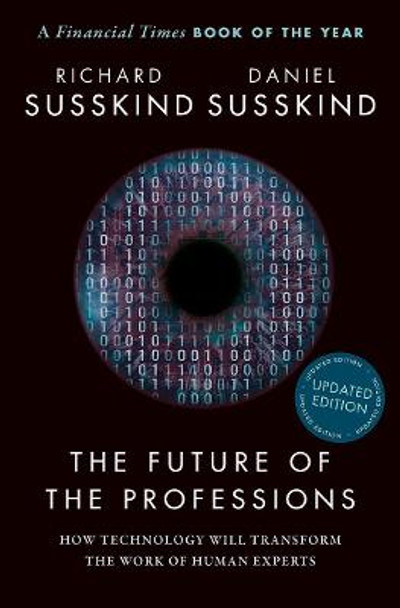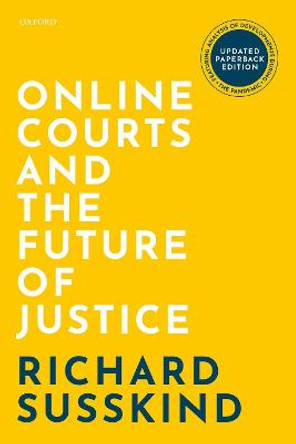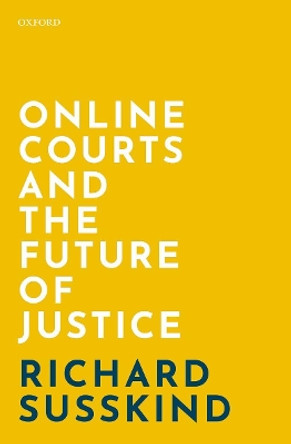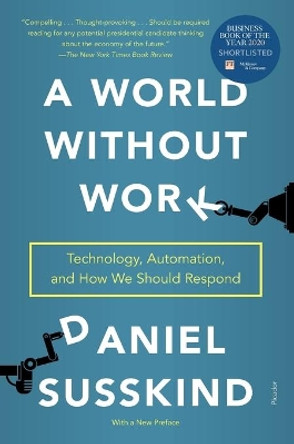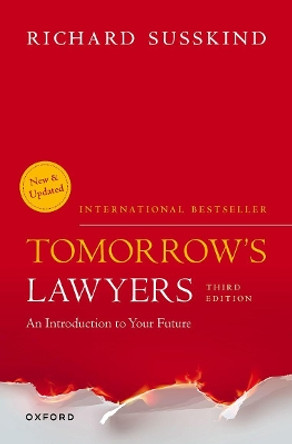Description
About the Author
Professor Richard Susskind OBE is an author, speaker, and independent adviser to international professional firms and national governments. He is President of the Society for Computers and Law, IT Adviser to the Lord Chief Justice of England, and Chair of the Advisory Board of the Oxford Internet Institute. His numerous books include the best-sellers The End of Lawyers?: Rethinking the nature of legal services (OUP, 2008) and Tomorrow's Lawyers: An Introduction to Your Future (OUP, 2013). His work has been translated into more than 10 languages, and he has been invited to speak in over 40 countries. He was educated at the University of Glasgow and Balliol College, Oxford. Daniel Susskind is a Fellow of Balliol College, Oxford, from where he has two degrees in economics. Previously, he worked for the British Government - in the Prime Minister's Strategy Unit, in the Policy Unit in 10 Downing Street, and as a Senior Policy Adviser at the Cabinet Office. He was a Kennedy Scholar at Harvard University.
Reviews
Review from previous edition Perhaps the forthcoming tidal wave of technology set to engulf us all will throw up new opportunities for the legal profession - which is probably why just about every lawyer in London, so we are told, has bought a copy of this challenging, provocative, timely and important book. If you care about the future of your profession and wish to add further comment to the raging controversies surrounding it, better get yourself a copy now. * Phillip Taylor MBE and Elizabeth Taylor of Richard Green Chambers *
In The Future of the Professions, father-and-son authors Richard and Daniel Susskind do a remorselessly effective job of demolishing the self-deception most people engage in when comparing themselves to machines. * Richard Waters, Financial Times *
The authors are undoubtedly right that the professions will change more in the next quarter-century than they have in the previous three. * The Economist *
Remarkable work. * Tom Watson, The Guardian *
This is a bold book ... The Future of the Professions helps us to recognise the professions' current methods as convoluted, self-serving rituals designed to wrap simple tasks in mystique. * Giles Wilkes, Prospect *
The Future of the Professions is a paradox that only a human mind could appreciate: the inevitable death of the professions is presented in an expert, original and witty work by two professionals whose skills (in thinking, writing and consultancy) are unlikely any time soon to be replicated by a machine. * David Pannick, The Times *
The Future of the Professions: How Technology Will Transform the Work of Human Experts, is a must read for anyone who wants to gain insights into where the legal profession is going ... Nothing else I have read more clearly and convincingly elucidates the future of legal services and how technology will transform the traditional practice of law. * Dan Pinnington, Slaw *
An act of delicious iconoclasm. * Prospect Magazine *
Both a good read and a good starter for strategic planning in professional firms * Chris Yapp, Future Tech Blog *
I suggest that everyone who considers themselves 'professional' reads this book, especially those who are aged, say, 20-45, who need to secure their role in the new world of work. The authors predict that "our professions will be dismantled incrementally". If they are right, todays lawyers need to prepare for it, and the sooner the better. * Dan Bindman, Legal Futures *
A fascinating and challenging book. * Medium *
The study is exceptionally well informed and important contribution to thinking about the future of professional work * Network Review *
As the saying is, the future is now and we ignore it at our peril. Please read this book. * Law Skills *
The book is written in a relaxed, flowing and easily-consumable style ... a read of The Future of the Professions is time very well-spent. * Jeremy Hopkins, Future of Law *
Everyone interested in the future well-being of society must read this thoroughly researched and compelling book - to understand how technology can and will be used to enable the public to do far more for themselves. In reshaping our system of justice so that it can more cost-effectively underpin our democratic society and its prosperity, I have had the benefit of the Susskinds core thesis how to use technology not simply to enable the legal professions to do better what they now do, but to reshape justice for the benefit of the public. * Lord Thomas of Cwmgiedd, the Lord Chief Justice of England and Wales *
If the Susskinds are right we are at the start of a social revolution. Technology has begun to transform social class, economic activity, political discourse, working life and the limits of human activity. In The Future of the Professions they relentlessly and unyieldingly but also entertainingly and elegantly set about proving their point. I started knowing that their argument was important, I finished convinced that it was right. This is a necessary book. It was necessary that it be written and necessary that you read it. * Daniel Finkelstein, The Times *
Impressive new book. * Edward Fennell, The Times *
I know of no better book for anyone interested in the future of skilled jobs and society. Drawing on an astounding range of sources and the latest research, The Future of the Professions offers vital insights into the unprecedented disruption facing all the professions. * Professor Ian Goldin, Professor of Globalisation and Development and Director of the Oxford Martin School, University of Oxford *
In this magisterial survey Richard and Daniel Susskind demolish each profession's faith in its immutable uniqueness. Instead they trace inexorable and universal forces that will drive disintermediation, deconstruction and disruption. Written with scholarly thoroughness, this is an urgent manifesto and practical blueprint for the leaders of every professional firm. * Philip Evans, Senior Partner & BCG Fellow, The Boston Consulting Group *
Book Information
ISBN 9780198841890
Author Richard Susskind
Format Paperback
Page Count 592
Imprint Oxford University Press
Publisher Oxford University Press
Weight(grams) 466g
Dimensions(mm) 195mm * 130mm * 37mm

